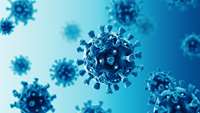The heat is on for building 3-D artificial organ tissues
Bioengineers are devising a hot new technology to remotely control the positioning and timing of cell functions to build 3-dimensional, artificial, living tissues.
Computational gene study suggests new pathway for COVID-19 inflammatory response
Analyses of lung fluid cells from COVID-19 patients conducted on the nation’s fastest supercomputer point to gene expression patterns that may explain the runaway symptoms produced by the body’s response to SARS-CoV-2.
Researchers develop new method to print tiny, functional organs
Researchers at EPFL have developed an approach to print tiny tissues that look and function almost like their full-sized counterpart. Measuring just a few centimeters across, the mini-tissues could allow scientists to study biological processes—and even test new treatment approaches—in ways that were previously not possible.
Stem cell research delivers new points of attack against Parkinson's disease
In a seven-year research effort, an international team of scientists has clarified the cause for certain genetic forms of Parkinson's disease, and has identified potential pharmacological treatments.
Organoids emerge as powerful tools for disease modeling and drug discovery
That's because organoids can mimic many of the anatomical and functional features of a wide variety of human tissues, and, for some tissue types, can be created more efficiently than other models such as cell lines or animal models.
Self-assembled particle gel for promoting blood vessel formation
NIMS has developed a low-cost self-assembled particle-based injectable gel for promoting blood vessel formation—a regenerative medicine process vital in cell and tissue transplantation.
Our white blood cells could be ‘reprogrammed’ to lower inflammation on demand
White blood cells receive ‘orders’ from our bodies to cause or subdue inflammation, a new paper reports, as a natural part of the immune response.
Feeding off fusion or the immortalization of tumor cells
Worldwide, cancer is the second leading cause of death—in 2018 alone, it claimed approximately 9.6 million lives, or one in six deaths. The development of cancer is incredibly complex and is controlled by an interplay of various factors—only recently, it became clear that the majority of human cancers such as cervical, gastrointestinal and breast among others, originate from adult stem cells becoming deregulated.
FEFU scientists propose to restore neural tissue with hydrogels based on modified pectins
Far Eastern Federal University (FEFU) scientists have developed implantable hydrogels based on plant polysaccharides (pectins). They can play the role of an artificial extracellular matrix, a special network of molecules that fills the space between body cells.
Scientists engineer customized blood vessels to support organ regeneration and identification of cancer treatments
A team led by Weill Cornell Medicine scientists has pioneered a method for manufacturing functioning human blood vessels and demonstrated that they can carry blood in lab-grown model organs and tumors. The discovery will enable disease modeling, and may facilitate the future production of human transplantable organs and identification of new precision drugs to treat cancer.












